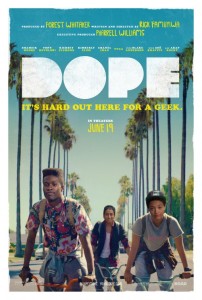Who knew drugs could be so dangerous? In Rick Famuyiwa’s Dope, the hallucinogen of choice is called Lily, a powdered form of MDMA that is supposed to make a person feel ecstatic. However for high-school student Malcolm Adekanbi (Shameik Moore), it only gets him into heaps of trouble. Malcolm gets forced into selling Lily in order to protect himself, his two best friends Diggy (Kiersey Clemons of Amazon’s Transparent) and Jib (Tony Revolori of Wes Anderson’s The Grand Budapest Hotel), and his mother Lisa (Kimberly Elise). The poor guy is also trying to get accepted into Harvard University but is told by his guidance counselor that he’s “arrogant” for even applying. All these things and more combine to make an invigorating, hilarious, and exceptional film about what it means to not do what’s expected of you.
Malcolm and his friends are unique but unlikeable. They attend a primarily black high school in Inglewood, California where they get picked on for the way they act (being interested in “shit white people like” such as skateboards) and the geeky clothes they wear. From the film’s opening shots in Malcolm’s bedroom, one would think they were watching a ‘90s period piece. Malcolm’s flattop hairstyle, cassette tapes, and gold chains are just his nostalgic accessories. He soon mentions Bitcoin (the online currency) and we realize that this story is set in present day. The story’s location is “The Bottoms,” a rough neighborhood that is home to thugs who steal the shoes right off your feet and gangsters who sell drugs and carry guns. So how does Malcolm get caught up in the middle of the dope world? By not doing what he did last week, which was masturbate to titillating rap videos on his phone. Instead, he and his crew attend Dom’s (A$AP Rocky) birthday party at a nightclub. Malcolm goes for a chance to dance with Nakia (Zoë Kravitz). Nakia is beautiful and nice and believes Malcolm is not like the other dudes in the neighborhood. In a charming scene, Malcolm offers to help Nakia study for her GED in the hopes that she’ll go to prom with him if she passes. This was the first scene that had me hooked on Dope. Cinema-wise, it’s nothing special. It takes place in a parked car. Yet the dialogue, the acting, and the overall feeling up to this point is just like what Nakia’s opinion is of Malcolm: something different. From here, it’s the opposite of a “slippery slope” (a term that gets discussed at length in the movie). Dope gets louder, funnier, and more poignant as the runtime goes on.
The film is like a rollercoaster when it comes to pacing. There are fast, energetic scenes like the one where a gruff gangster tracks the trio with the Find my iPhone app in order to steal a backpack full of drugs. And there are small, quiet, rolling-on-the-floor laughing moments. Blake Anderson of Workaholics shows up as hacker/recreational drug user Will. In a flashback, Will explains how that if he’s never had vaginal intercourse with a girl but has done everything else (including oral and anal), it possibly makes him gay. “I don’t know,” he tells the shocked listeners. Despite the serious subject matter of drugs and violence, there are still thrilling and good vibes to be had in this movie.
I’ve discussed the talent in front of the camera, so now we’ll dive into Dope’s filmmakers. I’m not an authority on writer-director Rick Famuyiwa’s work, but his hip script is relevant to today and the character development is awesome. Just because someone likes old-school hip-hop and wears funky clothes does not automatically make them interesting. Famuyiwa complicates his characters more by making them whole. They’re not always cool, even though they try to look the part. Academy Award winner Forest Whitaker narrates and produces the film. His voice really lends an almost nature-documentary feel to the flick. The cinematographer is Rachel Morrison, who before worked on the remarkable Fruitvale Station. Sean Combs executive produces along with Pharrell Williams, who also wrote the original songs. Malcolm’s band in the film is called Awreeoh (pronounced the same as “Oreo”) and they play punk rock music. “Can’t Bring Me Down” is reminiscent of Pharrell’s tunes with N.E.R.D. and “It’s My Turn Now” is a powerful and heavy anthem that gave me chills.
It had to be intentional for Famuyiwa to suggest (with alternate spelling) that the band be called “Oreo.” Oreos are black on the outside and white on the inside. This could imply that Malcolm’s black skin color is how he should represent himself to the world although he’s truly a white boy underneath. But Awreeoh is just a band name and “Oreo” is just what people will call you if they don’t understand you. We can’t label people and think we know who they are based on appearance. We also can’t put limitations on them like Malcolm’s guidance counselor does. Telling someone they’re arrogant for wanting to go to a good school is a sure-fire way to keep them in “The Bottoms.” Malcolm dresses differently to defy his community’s expectations. At first, he only knows how to do it on the surface with his clothing and his conversations about hip-hop. People consider him a “fake” in this way because he looks black but he’s not acting like it. He eventually learns that being real or fake has nothing to do with what something looks like; it has everything to do with attitude. If a person thinks of race as just black and white, two ends of a spectrum and nothing more, and doesn’t associate typical white interests with black people or vice-versa, then, frankly, that person is a buster (said this Middle-Eastern writer using a gang term with Latino origins—thanks urbandictionary.com).
My one minor complaint with Dope is how little attention was given to Malcolm’s mother Lisa. Lisa doesn’t hang around Malcolm that much and when they do share a scene together, her son barely acknowledges her. Perhaps previous hood movies focused too much on family and this one wanted to focus on the dynamic between the three friends. Dope was a hit at Sundance and Cannes, and rightfully so. It’s funny, empowering, and strikes a real chord with anyone who doesn’t feel like they belong. It asks the question, “Why shouldn’t they belong?” Let Dope not inspire you to be a drug dealer, but let it inspire you to be different. -L


Leave a Reply
You must be logged in to post a comment.